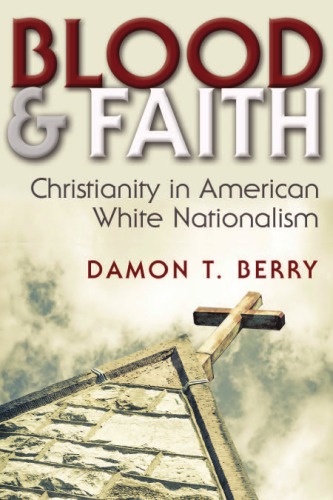
Blood and Faith
Christianity in American White Nationalism
کتاب های مرتبط
- اطلاعات
- نقد و بررسی
- دیدگاه کاربران
نقد و بررسی

Starred review from July 10, 2017
Berry’s groundbreaking debut traces the history of the “alt-right”—an offshoot of conservatism that mixes white nationalism and populism—while unpacking its relationship to the religious right and the tension between them. Certain branches of Christianity have long shared space with the nationalist movement in the U.S., but Berry provocatively posits that racialized Christian mythologies are not the only religious ideologies influencing white racist activists. Berry cites Odinism (a Norse-inspired paganism) and Creativity (a new age racialized movement that began in the 1970s) as the two main examples. Berry stresses that understanding this trend away from Christianity in racialized, right-wing politics is particularly important due to rising “pan-European ethnonationalism committed to the survival of the imagined global white racial community.” The chosen medium for the movement is the internet, and its goal is to undermine the mainstream political establishment. Berry’s primary mission is to examine why white nationalists are rejecting historical connections to racist Christianity in favor of a new Odinism, racialist Paganism, and other Euro-Aryan ideologies that are providing “spiritual” foundations for the larger goal of “white racial survival.” This is a must-read for all Americans who want to understand the shifting spiritual allegiances of the strengthening white nationalist movements throughout the U.S. and Europe.

Starred review from September 1, 2017
Despite the close association of the religious and political right in recent American politics, Christianity has not always fit easily within white nationalist movements. Scholar Berry (religious studies, St. Lawrence Univ.) offers an intellectual history of white nationalism that explores Christianity's often suspect place within far right, pan-European white identity movements. White nationalist thinkers, Berry argues, have persistently positioned Christianity as a non-European, Jewish faith alien to white racial community. In place of Christianity, these white nationalists offer spiritual alternatives they believe to be more authentically white. The study's first three chapters examine Revilo Oliver, William Pierce, and Ben Klassen as major figures in anti-Christian white nationalist thought; the last three examine Odinism, racialized esotericism, and the North American New Right as three contexts in which the "biologization of spirituality" has marginalized Christian practice in favor of a racialized faith. Although no study will answer all questions raised, Berry's analysis would have been deepened by discussion of how such a biologized spirituality shapes experiences of gender, sex, sexuality, and reproduction within white nationalist communities. VERDICT While most likely to appeal to subject specialists, this book is a timely contribution to national conversations about religion, race, and politics. Recommended for readers interested in the sociology of religion.--Anna J. Clutterbuck-Cook, Massachusetts Historical Soc.
Copyright 2017 Library Journal, LLC Used with permission.

























دیدگاه کاربران